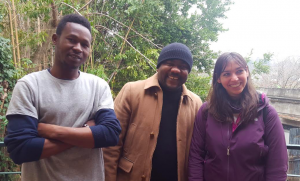NEWS UCEI strengthens its efforts for the reception and integration of migrants
 “You shall not give up to his master a slave who has escaped from his master to you. He shall dwell with you, in your midst, in the place that he shall choose within one of your towns, wherever it suits him. You shall not wrong him”. Also: “If your brother becomes poor… you shall support him as though he were a stranger and a sojourner, and he shall live with you”.
“You shall not give up to his master a slave who has escaped from his master to you. He shall dwell with you, in your midst, in the place that he shall choose within one of your towns, wherever it suits him. You shall not wrong him”. Also: “If your brother becomes poor… you shall support him as though he were a stranger and a sojourner, and he shall live with you”.
These are just some of the passages from Torah in which there are references to helping the other. It is an obligation from which we cannot escape provided that “these actions are not harmful to us”, as the Sages of the Talmud recommend.
It is from this double idea that the Council of the Union of Italian Jewish Communities (UCEI) has approved during its last session a project to back up local communities promoting initiatives for migrants and refugees.
It has been presented by the Office for Social Policies with the support of a special commission and UCEI Vice-president Giorgio Mortara as supervisor. This project has been launched with the awareness of “the obligation that we have towards refugees insofar as it does not attack our vital interests”. Therefore “we cannot reject people who cross our borders in search of integration and a future, but neither can we take responsibility for an unlimited amount of migrants without jeopardizing our already precarious economic system”. However, the presentation has clarified, “the discomfort of incomers is a key point of the Jewish moral conscience, which is favored by our memory of the past.”
“The events of the last weeks and months,” UCEI president Noemi di Segni said, “shift the focus back to issues such as reception of migrants, solidarity and integration. These extremely complex topics require mature and effective solutions and certainly not an eager quest for visibility. In this respect, the Italian society has plenty to learn from the Jewish experience. This is the principle behind our project, which reinforces our engagement in favor of human dignity and recognition of the other.”
She added, “Our commitment to reception and integration has its roots in Torah and the other fundamental texts of Judaism. This is an issue that we hold dear, because of what our texts state and what our experience has been over the centuries. Our first priority is to reiterate our leading and indispensable values, which are increasingly endangered”.
She finally said, “This initiative aims to provide significant support to local communities which have distinguished themselves in this area, boosting the existing devices and broadening the fields of assistance. It is a challenge which has developed under the sign of acceptance, but also of real and genuine integration. We intend to give central importance to the respect of fundamental rights and duties which those being helped are endowed with towards the community.
The idea of financing through the profits from Eight per thousand those communities who have, or at least would like to, put into place reception and support projects comes from the assumption that the acceptance of migrants is a duty for the Jewish Italian Communities, so long as it is viable and does not cause any trouble to them.
Among the initiatives worth mentioning is the commitment of the Jewish Community of Milan, with the collaboration of the associations Oasi del Clochard, City Angels, Betè Avon, Gruppo Giovanile Hashomer Hatzair AME and Benè Berith, and the one from the communities of Turin and Florence, which both propose reception projects with Vice-president Alda Guastalla and the social worker Alice Gamba as supervisors in Turin and President Daniela Misul and Assessor David Palterer in Florence.
Our final objective is to create a network of subsidiarity and help in order to improve the conditions of people in difficulty and contribute to their integration, “also relying on the collaboration with public health structures and other voluntary organizations, with the purpose of boosting help.”
This project has been developed in the name of Tzedakah, a pillar of Jewish identity, and has received support in various forms: healthcare, clothes, education, help for integration, and accommodation for medium and short stays.
(In the picture there are some of the guests in the facility run by the co-operative Il Cenacolo in a venue owned by the Jewish Community of Florence and rented at a controlled price. Coordinator Marina Cascella is with them)
Translated by Mattia Stefani and revised by Claudia Azzalini, both students at the Advanced School of Modern Languages for Interpreting and Translation of Trieste University and interns at the newspaper office of the Union of the Italian Jewish Communities.
